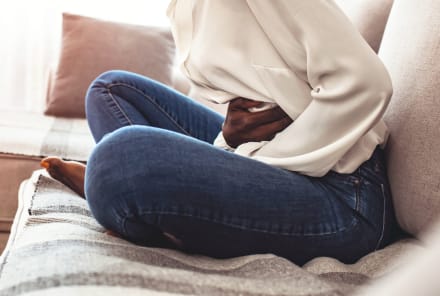Advertisement
4 Surprising Things That Can Impact Dementia, From A Psychiatrist


With cognitive decline, it's important to focus on early intervention and doing what you can to prevent the onset—but that's not to say you can't do anything about it once symptoms arise. Just take it from functional medicine psychiatrist Kat Toups, M.D.: On this episode of the mindbodygreen podcast, she shares how she healed her own serious autoimmune disease and cognitive impairment. "Gradually, there came a day that my brain came back online," she recounts. "It was really exciting when I realized I could hold the seven digits of a phone number in my head and dial the number again."
It was a three-year process, but since then she's learned how to help her patients heal much more quickly—in fact, she published a dementia study this past summer (along with neurologist Dale Bredesen, M.D., who we've also had on the show), in which 84% of patients with mild cognitive impairment got better after only nine months.
Still, prevention is the best medicine. To learn more about Toups' specific protocol, be sure to tune into the full episode (or video below); for now, check out some underrated factors that can significantly impact your brain health over time:
Your oral microbiome
We've said it before, and we'll say it again: Your mouth is the gateway to your body and the beginning of your gastrointestinal tract (and we likely don't have to remind you of the gut-brain connection). "[Your mouth] is right next to the brain," adds Toups. "And what's in the mouth and nose can travel right up into the brain so easily… It's quite easy for bacteria to track up there."
Specifically, research has found that the bacteria P. gingivalis, the key pathogen in periodontitis, was identified in the brain of Alzheimer's disease patients1. Another study suggests a possible link between F. nucleatum (another periodontal pathogen) and Alzheimer's disease2. "Different types of pathogens in our mouth are going to different parts of our body and turning on different diseases," Toups adds, who recommends getting your oral microbiome tested if you can (she recommends MyPerioPath).
Sleep
OK, this factor might not be so underrated, especially if you've been an avid mindbodygreen reader. Quality sleep is the foundation of well-being since poor shut-eye can affect everything from metabolism to mood to, yep, brain health. "Our brains detoxify and regenerate while we sleep, so we definitely need to take steps to protect our sleep and get enough sleep," notes Toups.
In fact, the sleep-brain connection is so strong that poor sleepers have around a 68% higher risk of contracting Alzheimer's. All that to say: Seriously try to prioritize your sleep. Whether you eat sleep-supporting foods, opt for a relaxing stretch before bed, or take a natural sleep aid, find the avenue that works best for you.
Hearing loss
"Midlife hearing loss is a huge risk factor for dementia, and it is the biggest modifiable cause," says Toups. "I mean, it's easy to fix. You get a hearing aid." Research backs up the claim: A 2020 Lancet commission report lists hearing loss as one of the top risk factors for dementia3 but notes that using hearing aids appears to reduce the excess risk.
"So if people are having hearing loss now, please get that checked out early," Toups says. You might think that hearing loss is a natural part of aging, and to some degree it might be, but "if you're not hearing properly, you're not getting those inputs into your brain all the time," Toups adds. "As people are aging, they should have that on their awareness."
Heavy metals
In Toups' practice, "We definitely see higher levels on average of things like mercury, lead, and cadmium, but we can detox these things quite easily," she says. Research has associated some of those metals (namely lead and cadmium) with impaired cognitive function and cognitive decline4, especially as our world grows increasingly more toxic. However, as Toups notes, you can support your natural detoxification processes in the name of brain health.
One of her tips? Sweating. "Sweating is a great way for our bodies to detoxify," she says. "And there's been nice studies done that show we will excrete heavy metals when we sweat5." She recommends opting for hot yoga or sauna bathing—basically any activity that will encourage sweating. Just make sure you rinse off shortly after: "After you do a sauna or heavy exercise, go jump in the shower with some soap and wash it off because you've just mobilized all these toxins, and you don't want them to dry and reabsorb back into your body," she explains.
The takeaway
If you're serious about protecting your brain as you age, you'll want the above factors on your radar. They may be less obvious, but according to Toups, they can make a significant difference over time.
We hope you enjoy this episode! And don't forget to subscribe to our podcast on iTunes, Google Podcasts, Spotify, or Amazon Music!
Watch Next
Enjoy some of our favorite clips from classes
Enjoy some of our favorite clips from classes
What Is Meditation?
Mindfulness/Spirituality | Light Watkins
Box Breathing
Mindfulness/Spirituality | Gwen Dittmar
What Breathwork Can Address
Mindfulness/Spirituality | Gwen Dittmar
The 8 Limbs of Yoga - What is Asana?
Yoga | Caley Alyssa
Two Standing Postures to Open Up Tight Hips
Yoga | Caley Alyssa
How Plants Can Optimize Athletic Performance
Nutrition | Rich Roll
What to Eat Before a Workout
Nutrition | Rich Roll
How Ayurveda Helps Us Navigate Modern Life
Nutrition | Sahara Rose
Messages About Love & Relationships
Love & Relationships | Esther Perel
Love Languages
Love & Relationships | Esther Perel
What Is Meditation?
Box Breathing
What Breathwork Can Address
The 8 Limbs of Yoga - What is Asana?
Two Standing Postures to Open Up Tight Hips
How Plants Can Optimize Athletic Performance
What to Eat Before a Workout
How Ayurveda Helps Us Navigate Modern Life
Messages About Love & Relationships
Love Languages
Advertisement

Yes, There's A Longevity Vitamin (& People Over 40 Need To Prioritize It)
Molly Knudsen, M.S., RDN

Study Investigates How Fasting Impacts Sleep, Hormone Health & More
Gretchen Lidicker, M.S.

Yes, There's A Longevity Vitamin (& People Over 40 Need To Prioritize It)
Molly Knudsen, M.S., RDN

Study Investigates How Fasting Impacts Sleep, Hormone Health & More
Gretchen Lidicker, M.S.

Yes, There's A Longevity Vitamin (& People Over 40 Need To Prioritize It)
Molly Knudsen, M.S., RDN

Study Investigates How Fasting Impacts Sleep, Hormone Health & More
Gretchen Lidicker, M.S.

Yes, There's A Longevity Vitamin (& People Over 40 Need To Prioritize It)
Molly Knudsen, M.S., RDN

Study Investigates How Fasting Impacts Sleep, Hormone Health & More
Gretchen Lidicker, M.S.














